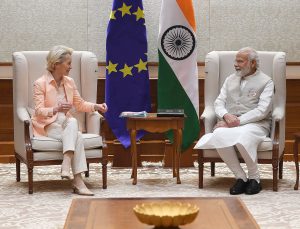Continuing with its accelerated diplomatic outreach, India welcomed European Commission President Ursula von der Leyen as well as the foreign ministers from Lithuania, Luxembourg, Norway, Poland, Portugal, Slovenia, and the Netherlands in New Delhi on the occasion of the Raisina Dialogue being held from April 25 to 27. In addition, Indian Prime Minister Narendra Modi is visiting Germany, Denmark, and France from May 2 to 4.
These back-to-back engagements should give momentum to India’s relations with European countries. This is also an opportunity for India and European countries to iron out their differences over the perception of strategic threats emerging from Russia and China.
Since the start of the Russia-Ukraine war, the European countries along with the United States have insisted that India side with them and oppose Russia’s aggression, a call that India has resisted so far. India’s External Affairs Minister Dr. S. Jaishankar, while addressing the Raisina Dialogue, highlighted how Europe chose not to respond when the rules-based order was under threat in Asia.
European countries have been very vocal in criticizing Russia for its war against Ukraine. However, these countries have treaded carefully with respect to China despite increasing friction between both the entities – until now. Especially following China’s refusal to criticize Russia over its Ukraine invasion, discord between Europe and China is increasingly apparent.
The EU-China Summit was held on April 1 after about two years. The meeting, however, failed to bridge the increasing gap between the EU and China. The EU raised issues such as Ukraine, sanctions against Members of European Parliament (MEPs), and human right violations, including in Hong Kong. China did not address these criticisms. Instead China expressed its preference to see the EU pursue strategic autonomy by detaching from the United States. EU High Representative for Foreign Affairs Josep Borrell termed this meeting as “dialogue of the deaf” since the EU and China are clearly moving in opposite directions and seeking each other’s support on politically impossible issues.
Tensions have made two previous successes in China-Europe relations looks like failures: a bilateral investment treaty and China’s high-profile bid to engage Central and Eastern Europe.
The EU and China concluded negotiations in principle for a Comprehensive Agreement on Investment (CAI) in December 2020. This agreement was intended to create a level playing field for investors in both markets. But in May 2021, less than six months after the negotiations concluded, the European Parliament voted to freeze the legislative process for ratifying this deal. This move came in the wake of disputes between Brussels and Beijing where both imposed sanctions and counter-sanctions on each other’s officials. Right from its inception, this deal was considered as benefitting China more than the EU. Also this deal was criticized by the United States, which complained that the EU failed to raise the issue of forced labor by China. This deal now faces an uncertain future as relations between the EU and China show no signs of improvement.
China’s cooperation with Central and Eastern European countries has also hit a rough patch. Through the 17+1 initiative, which was launched in 2012 as the 16+1, China intended to invest in infrastructure development in Central and Eastern Europe, which is relatively less developed than Western Europe. However, Lithuania quit in 2021, criticizing China for creating divisions within the EU through this grouping. Other Central and Eastern European countries are also dissatisfied with the functioning of the 17+1. Since Western Europe continues to receive more Chinese FDI than the Central and Eastern Europe, the purpose of the initiative seems defeated.
Moreover, China siding with Russia in the latter’s war against Ukraine is a cause of concern for Central and Eastern European countries. Mareike Ohlberg, a senior fellow in the Asia program at the German Marshall Fund of the United States, said, “China’s siding with Russia and blaming NATO is absolutely unacceptable for most of Central and Eastern Europe. The Chinese government doesn’t seem to understand, or doesn’t want to understand, that Russia’s war of aggression against Ukraine is seen as an existential issue for most countries in the region.”
Tensions between European countries and China have been simmering for a long time. The Russia-Ukraine conflict should further make it an easy choice for Europe to rethink its relations with China. That opens doors for India.
Since the Russia-Ukraine war, India has been taking steps to distance itself from Russia and move closer to the West. Similarly, it is pertinent for European countries to acknowledge the strategic threat that China poses not just to India but also to the international rules-based order.
European countries are already showing some encouraging indications of strengthening relations with India. During von der Leyen’s visit, India and the EU agreed to launch the India-EU Trade and Technology Council to tackle key trade, economic, and technological challenges. Also in the past about two years, the EU, France, Germany, the Netherlands, and the U.K. have formulated their respective policies on the Indo-Pacific region. Greater engagement between India and European countries would allow them to address shared concerns regarding rules-based order and freedom of navigation.
Stronger relations with India would benefit European countries, not just in economic terms but also in their outreach to the Indo-Pacific region.

































